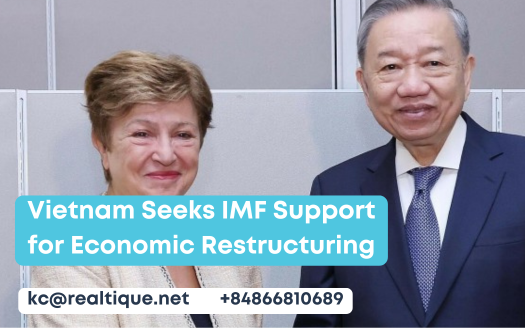Vietnam Seeks IMF Support for Economic Restructuring
Vietnam’s pursuit of support from the International Monetary Fund (IMF) marks a significant step in its economic restructuring expedition. As the nation aims to synchronize its development strategies with sustainable practices and advanced technologies, the implications of this partnership extend beyond immediate financial assistance. This engagement poses questions about the future path of Vietnam’s economy amidst global uncertainties and its ambitions for high-income status by 2045. Exploring the subtleties of this collaboration reveals critical factors that could shape not only Vietnam’s economic terrain but also its position in the broader regional framework.
Table of Contents
Vietnam's Proposal for IMF Assistance
In a strategic move to enhance its economic structure, Vietnam’s President and General Secretary Tô Lâm engaged with the leadership of the International Monetary Fund (IMF) to discuss a proposal for ongoing support.
The dialogue emphasized Vietnam’s commitment to shifting towards a new growth model that prioritizes sustainable development. Vietnam’s President and General Secretary Tô Lâm articulated the need for continued IMF assistance to effectively implement vital economic reforms.
Central to this initiative is the focus on green alteration and the integration of advanced technologies, including artificial intelligence.
As Vietnam positions itself among the world’s largest economies, leveraging IMF support is essential for navigating economic challenges and promoting resilience in a rapidly changing global environment.
This collaboration aims to align Vietnam’s economic strategies with international standards and best practices.
Vietnam's Economic Growth and Resilience
Amidst global economic uncertainties, Vietnam has emerged as a notable bright spot, demonstrating strong growth and resilience.
Recognized by the IMF as a strong economy, Vietnam’s growth path is underpinned by solid fundamentals and an increasing capacity to absorb external shocks. This resilience positions the nation favorably against global volatility, with aspirations to raise its status to high-income by 2045.
The government’s commitment to sustainable development and inclusive policies further enhances this outlook. By focusing on a new growth model that incorporates technology and green change, Vietnam is not only navigating current challenges but is also laying the groundwork for long-term stability and prosperity in the face of progressing global movements.
Vietnam Strengthening US Business Relations
Vietnam’s economic resilience not only emphasizes its growth potential but also sets the stage for strengthened business relations with the United States.
Tô Lâm’s active engagement with U.S. enterprises highlights Vietnam’s commitment to enhancing investment opportunities. American investors recognize Vietnam’s vibrant market and are encouraged to investigate collaboration, particularly in high-tech and chip manufacturing sectors.
This partnership can position Vietnam as a leading investment destination in Southeast Asia. Additionally, the Vietnamese government is advocating for increased U.S. investments in research and development, promoting innovation that aligns with its economic restructuring goals.
Strengthening these ties will not only benefit both nations but also contribute to regional stability and shared economic growth in an increasingly interconnected global economy.
Technology and Innovation Collaboration
Through a strategic focus on technology and innovation, Vietnam is positioning itself as an emerging hub for high-tech industries. The government is actively enhancing cooperation in high-tech sectors and cultivating innovation ecosystems.
By attracting global tech firms to establish R&D centers, Vietnam aims to utilize its skilled workforce and enhance its competitive edge. The establishment of a national innovation center will facilitate collaboration among local and international experts, driving advancements in technology.
Additionally, efforts to create a conducive environment for startups are critical for nurturing innovation. By prioritizing investments in technology and science, Vietnam is committed to reshaping its economic environment, ultimately aiming for sustainable growth and increased resilience in the global market.
As Vietnam strengthens its position in the high-tech sector, the nation is also formulating extensive strategies to guarantee sustainable economic growth and resilience in the face of global challenges.
Key components of these future economic strategies include:
- Transitioning to a green economy by promoting sustainable practices across industries.
- Enhancing investment in research and development to encourage innovation.
- Strengthening regional cooperation with ASEAN members to enhance economic integration.
- Focusing on human capital development to align skills with market demands.
- Expanding public-private partnerships to drive infrastructure improvements.
Through these strategies, Vietnam aims to not only achieve high-income status by 2045 but also to become a crucial player in global economic governance and sustainable development initiatives.
In summary, Vietnam’s pursuit of IMF support highlights the nation’s commitment to economic restructuring and sustainable development. By aligning with the IMF, Vietnam aims to enhance economic resilience, promote technological innovation, and strengthen international partnerships, particularly with the United States. These efforts are essential in navigating global economic challenges and achieving the ambitious goal of high-income status by 2045. The collaboration with the IMF will play a significant role in facilitating Vietnam’s transition to a new growth model.





